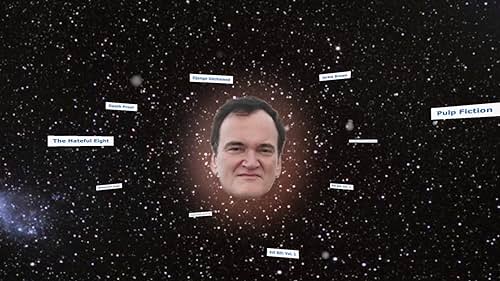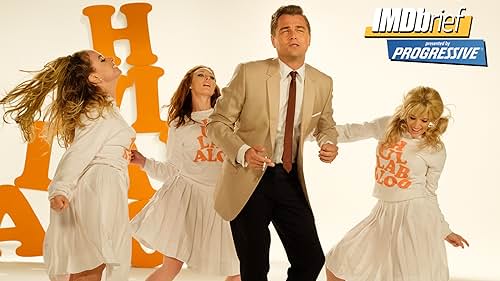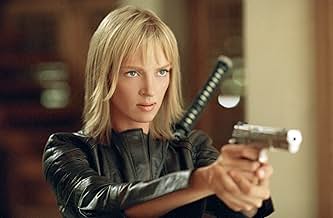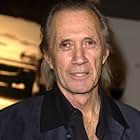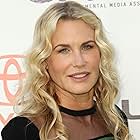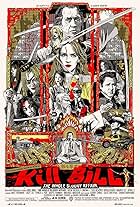La mariée poursuit sa quête de vengeance contre son ancien chef et amant Bill, le videur solitaire Budd, et la traître et borgne Elle.La mariée poursuit sa quête de vengeance contre son ancien chef et amant Bill, le videur solitaire Budd, et la traître et borgne Elle.La mariée poursuit sa quête de vengeance contre son ancien chef et amant Bill, le videur solitaire Budd, et la traître et borgne Elle.
- Récompenses
- 23 victoires et 84 nominations au total
Ambrosia Kelley
- Nikki
- (as Ambrosia Kelly)
Yoshiyuki Morishita
- Tokyo Businessman
- (as Yoshijuki Morishita)
Gorô Daimon
- Boss Honda
- (as Goro Daimon)
Histoire
Le saviez-vous
- AnecdotesQuentin Tarantino originally intended to only have Pai Mei's lips speaking Cantonese, while his voice would be in English, imitating a bad dub job. Tarantino was going to provide the voice himself. In the end, Tarantino abandoned this idea, and Pai Mei (Chia-Hui Liu) speaks in his own voice.
- GaffesWhen Beatrix is on the patio, after being "shot" by her daughter, she is sitting on the ground hugging her, the sword on her back disappears and reappears numerous times between shots.
- Citations
Bill: Pai Mei taught you the five point palm-exploding heart technique?
The Bride: Of course he did.
Bill: Why didn't you tell me?
The Bride: I don't know... because I'm a bad person.
Bill: No. You're not a bad person. You're a terrific person. You're my favorite person, but every once in a while, you can be a real cunt.
- Crédits fousAfter the credits there is an outtake with Uma Thurman.
- Versions alternativesHong Kong version differs very slightly from the US version. The only difference is that some alternate shots were used in the scene where Beatrix drives to Esteban and the scene where she finally goes to him in the village.
- ConnexionsEdited into Kill Bill: The Whole Bloody Affair (2006)
- Bandes originalesAbout Her
Written by Malcolm McLaren (as M. McLaren), W.C. Handy, Rod Argent
Performed by Malcolm McLaren
Courtesy of Malcolm McLaren
Contains samples of "She's Not There"
Written by Rod Argent
Published by Marquis Music Co. Ltd.
Performed by The Zombies
Licensed courtesy of Marquis Enterprises Limited
and of "St. Louis Blues"
Written by W.C. Handy (as William C. Handy)
Published by Handy Brothers Music Co., Inc., New York
Administered by EMI Music Publishing Ltd.
On behalf of Francis Day & Hunter
Performed by Bessie Smith
Original recording from the film "St. Louis Blues" in 1929
Used with permission. All rights reserved.
Commentaire à la une
It's a matter of some debate which volume of Quentin Tarantino's "Kill Bill" is better. Let's end the argument right now: David Carradine doesn't even appear in "Volume 1." Hasn't the Academy mailed him his Best Supporting Actor Oscar already?
In the first volume of "Kill Bill," released only a few months before "Vol. 2" in the tail end of 2003, we met Uma Thurman, one peeded-off super-assassin taking out some folks from her past one at a time, with the occasional mega-posse thrown in for interest. "Vol. 1" had a lot of blood, violence, and wisecracks, and galloped across the screen like a rap video on steroids.
"Vol. 2" is way different. It makes sense it's a separate movie; the tone is such a departure from "Vol. 1" in two ways. One is style. Director Tarantino has fun stylistically quoting Sergio Leone and chop-fu cheapos from the late 1960s and early 1970s. Cinematic sampling is something he's good at and enjoys, but in "Vol. 2" he doesn't go as overboard as he does in "Vol. 1." He pulls back and lets the plot breathe, rather than filling every spare second with a homage-cum-parody that maybe a dozen lucky fans will get. Maybe some here wish he'd pile it on a bit more, but they have to make do with the goofy Pei Mai sequence, which is a flashback and hence not jarring in its "Vol. 1"-style comic-book treatment. Throughout "Vol. 2" the emphasis is on storytelling and character-building, which is where it should be given we are now being asked to deepen our commitment of interest to these people. "Vol. 1" is okay for what it is, but its flash and action are no match for the depth and nuance of "Vol. 2."
This gets to the second different tonal difference between the films, which is emotional. It all comes back to the characters. They don't quite become real people here, but they get close enough to get under your skin. Admittedly, the opening part of "Vol. 2" tests the viewer's patience a bit, there's some long bits that show the director hasn't really mastered self-discipline, like with Thurman's graveyard struggle, but the meandering usually has a purpose. Tarantino is building toward something here that has its payoff when Thurman's character finally has her face-to-face showdown with Carradine's Bill.
From that moment forward to the end, this is the best Tarantino has ever been.
Carradine and Thurman dominate the proceedings with two of the finest performances I've seen, certainly the best Tarantino has directed, playing off the mythology we've been taught in "Vol. 1" and developing resonances with the viewer both together and apart which will surprise those expecting a casual butt-kicking affair. We finally find out what Carradine means in the first line of "Vol. 1" where he tells a whimpering victim he is being masochistic, not sadistic, and its a powerful revelation, that this sinister baddie may have a heart buried under that cold exterior. Carradine is perfect in his phrasing, his pauses, the tired glint in his eye, or the way he says "Kiddo." You can't ask for a better veteran performance. For her part, Thurman presents a brilliantly conflicted character who can not stop either hating or loving Bill, and brings us not into a world of cartoon anguish, but real human pain.
"Kill Bill Vol. 2" is slow-moving, and needs "Vol. 1" in a way few sequels do, since it assumes you know nearly all the characters coming in. That's a weakness. So are some undeniably pointless bits, including the entire sequence with Bill's father figure, Esteban Vihaio, and some business at a bar involving Michael Madsen, who plays a former assassin now gone to seed.
Madsen's good, though, and so's Daryl Hannah as another rather mouthy assassin, Gordon Liu as Pei Mei, and especially Perla Haney-Jardine as a girl named B.B. The nice thing with Tarantino is for every scene that strikes a bum note, there's four or five that hit the right mark, and some manage to do much more. My favorite scene involves a Mexican standoff in an L.A. hotel room between Thurman's character and an anonymous hitwoman, at once grippingly suspenseful, hilarious, and life-affirming. Still, it's the final moments of this film that will stay with you, as Bill and his former pupil work out their "unfinished business" and we are left to ponder the results of their decisions and actions.
"Kill Bill Vol. 2" may not reach the heights of cinema to which it aspires, the level of "The Good, The Bad, And The Ugly" quoted in its score, but it's a fine film that will make most viewers glad they stuck around for the second installment. I am.
In the first volume of "Kill Bill," released only a few months before "Vol. 2" in the tail end of 2003, we met Uma Thurman, one peeded-off super-assassin taking out some folks from her past one at a time, with the occasional mega-posse thrown in for interest. "Vol. 1" had a lot of blood, violence, and wisecracks, and galloped across the screen like a rap video on steroids.
"Vol. 2" is way different. It makes sense it's a separate movie; the tone is such a departure from "Vol. 1" in two ways. One is style. Director Tarantino has fun stylistically quoting Sergio Leone and chop-fu cheapos from the late 1960s and early 1970s. Cinematic sampling is something he's good at and enjoys, but in "Vol. 2" he doesn't go as overboard as he does in "Vol. 1." He pulls back and lets the plot breathe, rather than filling every spare second with a homage-cum-parody that maybe a dozen lucky fans will get. Maybe some here wish he'd pile it on a bit more, but they have to make do with the goofy Pei Mai sequence, which is a flashback and hence not jarring in its "Vol. 1"-style comic-book treatment. Throughout "Vol. 2" the emphasis is on storytelling and character-building, which is where it should be given we are now being asked to deepen our commitment of interest to these people. "Vol. 1" is okay for what it is, but its flash and action are no match for the depth and nuance of "Vol. 2."
This gets to the second different tonal difference between the films, which is emotional. It all comes back to the characters. They don't quite become real people here, but they get close enough to get under your skin. Admittedly, the opening part of "Vol. 2" tests the viewer's patience a bit, there's some long bits that show the director hasn't really mastered self-discipline, like with Thurman's graveyard struggle, but the meandering usually has a purpose. Tarantino is building toward something here that has its payoff when Thurman's character finally has her face-to-face showdown with Carradine's Bill.
From that moment forward to the end, this is the best Tarantino has ever been.
Carradine and Thurman dominate the proceedings with two of the finest performances I've seen, certainly the best Tarantino has directed, playing off the mythology we've been taught in "Vol. 1" and developing resonances with the viewer both together and apart which will surprise those expecting a casual butt-kicking affair. We finally find out what Carradine means in the first line of "Vol. 1" where he tells a whimpering victim he is being masochistic, not sadistic, and its a powerful revelation, that this sinister baddie may have a heart buried under that cold exterior. Carradine is perfect in his phrasing, his pauses, the tired glint in his eye, or the way he says "Kiddo." You can't ask for a better veteran performance. For her part, Thurman presents a brilliantly conflicted character who can not stop either hating or loving Bill, and brings us not into a world of cartoon anguish, but real human pain.
"Kill Bill Vol. 2" is slow-moving, and needs "Vol. 1" in a way few sequels do, since it assumes you know nearly all the characters coming in. That's a weakness. So are some undeniably pointless bits, including the entire sequence with Bill's father figure, Esteban Vihaio, and some business at a bar involving Michael Madsen, who plays a former assassin now gone to seed.
Madsen's good, though, and so's Daryl Hannah as another rather mouthy assassin, Gordon Liu as Pei Mei, and especially Perla Haney-Jardine as a girl named B.B. The nice thing with Tarantino is for every scene that strikes a bum note, there's four or five that hit the right mark, and some manage to do much more. My favorite scene involves a Mexican standoff in an L.A. hotel room between Thurman's character and an anonymous hitwoman, at once grippingly suspenseful, hilarious, and life-affirming. Still, it's the final moments of this film that will stay with you, as Bill and his former pupil work out their "unfinished business" and we are left to ponder the results of their decisions and actions.
"Kill Bill Vol. 2" may not reach the heights of cinema to which it aspires, the level of "The Good, The Bad, And The Ugly" quoted in its score, but it's a fine film that will make most viewers glad they stuck around for the second installment. I am.
Meilleurs choix
Connectez-vous pour évaluer et suivre la liste de favoris afin de recevoir des recommandations personnalisées
Détails
- Date de sortie
- Pays d’origine
- Site officiel
- Langues
- Aussi connu sous le nom de
- Kill Bill Volumen 2
- Lieux de tournage
- Sociétés de production
- Voir plus de crédits d'entreprise sur IMDbPro
Box-office
- Budget
- 30 000 000 $US (estimé)
- Montant brut aux États-Unis et au Canada
- 66 208 183 $US
- Week-end de sortie aux États-Unis et au Canada
- 25 600 000 $US
- 18 avr. 2004
- Montant brut mondial
- 154 118 514 $US
- Durée2 heures 17 minutes
- Couleur
- Mixage
- Rapport de forme
- 2.39 : 1
Contribuer à cette page
Suggérer une modification ou ajouter du contenu manquant



